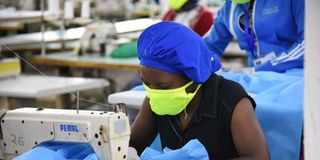Kebs raises PPE standards amid concerns in fight against Covid-19

What you need to know:
- As the battle against Covid-19 rages on, concerns have been raised about the quality of personal protective equipment (PPEs) in the market.
- As such, the Kenya Bureau of Standards (KEBS) added five more standards on the equipment to strengthen the war on the virus.
- The standardisation body approved Publicly Available Specification (KPAS) 2919:2020 that gives minimum specifications for face shields as protective gear used by healthcare service providers.
The face mask is the most visible ‘weapon’ in the fight against the novel coronavirus but not any mask can protect you from contracting the virus that has already killed 225 people in Kenya.
Some could be defective or substandard, putting people in danger of contracting the disease.
As the battle against Covid-19 rages on, concerns have been raised about the quality of personal protective equipment (PPEs) in the market.
Already, several healthcare workers including a doctor have died from Covid-19 and at least 450 are infected, according to the Kenya Health Professionals Society.
Initially, healthcare workers complained of defective and substandard PPEs saying this was the main contributing factor to increased cases of infections among them.
HIGHER STANDARDS
As such, the Kenya Bureau of Standards (KEBS) has added five more standards on the equipment to strengthen the war on the virus.
The standardisation body approved Publicly Available Specification (KPAS) 2919:2020 that gives minimum specifications for face shields as protective gear used by healthcare service providers.
Face shields complement masks, goggles, hoods, and other PPEs to offer protection to medical personnel.
“The approved standard will guide manufacturers on the key requirements of a face shield in line with concepts of face protection devices, construction, performance and safety requirements,” said Kebs Managing Director Bernard Njiraini.
Kebs’ Director of Metrology and Testing, Henry Rotich, said, “Accuracy of measurements is very important in production of non-pharmacological medical devices. These standards are important in meeting customer requirements on safety of products.”
The products should be friendly to the environment and their performance should be optimal, Dr Rotich added.
FAULTY EQUIPMENT
While PPEs protect healthcare providers and the general public from contracting Covid-19, many different medical equipment are being used in the battle, some of which have been cited as faulty.
These include thermo-guns, some of which cannot measure temperature or show varying figures when a person is screened using two different devices at the same time.
“Some unscrupulous traders may be there. That is why we have a multi-agency team to take action,” said Dr Rotich.
Thus, the standardisation body added standards (KPAS 2920:2020) in the manufacture of nebulisers and sanitisation booths as well.
The booths are used in supermarkets, open markets and other public places to help reduce the spread of the virus while nebuliser machines help in the dispensation of medicines in mist or spray form.
In addition to the five new standards which include standards for breathing systems for anesthetic and respiratory use, Kenya has 16 standards for use in response to the pandemic.
CLOTHE MASKS
The other standards approved and released earlier include specifications for instant hand sanitisers, critical care ventilators, surgical face masks, reusable cloth masks, single-use medical examination gloves, single-use sterile rubber surgical gloves, protective clothing used by health workers, healthcare aprons and overalls.
Dr Rotich said clothe masks should be worn by people who are not “very exposed” to the virus.
Although these masks offer a certain percentage of protection, the World Health Organization (WHO) recommends use of surgical and N95 masks for the old and most at risk.
REPORTING
As the country gears towards utilising locally manufactured PPEs, Kenyans should also be on the lookout for defective and substandard products, the director said.
“Most importantly, Kenyans should buy products from legitimate and certified sources. They can send a short message with the safety mark (SM) to 20023 to know if a product is certified or not,” said Dr Rotich.
He said the public can also call toll free number 1545, to report issues including impersonation and corruption.
“We are doing sampling and market surveillance to make sure everyone is compliant,” Dr Rotich said, adding the body has been supporting innovations and making Kenyan products competitive in the region.
As such, the standardisation body has approved Kenyatta University’s ventilator prototype, amid an increase in the number of Covid-19 patients presenting with serious illness.
Dr Rotich said certification for ventilators from Kimathi University and Mutsimoto (Kenya Association of Manufacturers) and permit approval for locally manufactured PPEs and other medical equipment are ongoing.





